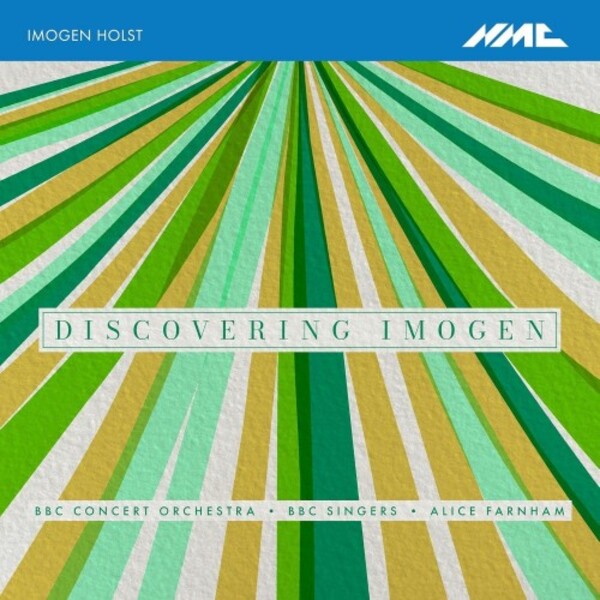HOLST 'Discovering Imogen'
View record and artist detailsRecord and Artist Details
Genre:
Orchestral
Label: NMC
Magazine Review Date: AW2024
Media Format: CD or Download
Media Runtime: 74
Mastering:
DDD
Catalogue Number: NMCD280

Tracks:
| Composition | Artist Credit |
|---|---|
| Persephone |
Imogen Holst, Composer
Alice Farnham, Conductor BBC Concert Orchestra |
| Variations on 'Loth to Depart' |
Imogen Holst, Composer
Alice Farnham, Conductor BBC Concert Orchestra |
| What Man is He? |
Imogen Holst, Composer
Alice Farnham, Conductor BBC Concert Orchestra BBC Singers |
| Allegro assai |
Imogen Holst, Composer
Alice Farnham, Conductor BBC Concert Orchestra |
| On Westhall Hill |
Imogen Holst, Composer
Alice Farnham, Conductor BBC Concert Orchestra |
| Suite for Strings |
Imogen Holst, Composer
Alice Farnham, Conductor BBC Concert Orchestra |
| Festival Anthem |
Imogen Holst, Composer
Alice Farnham, Conductor BBC Concert Orchestra BBC Singers |
Author: Jeremy Dibble
This very welcome album provides a valuable overview of Imogen Holst’s music across a period of 30 years between her student days at the RCM (where she studied composition with George Dyson) in 1929 and her career at Aldeburgh, where she not only assisted Britten but (from 1956) was also one of the Festival’s artistic directors. The Allegro assai (1927), composed the year after she entered the RCM, was evidently intended as part of a larger suite for strings, but only this movement survives. An attractive work, couched largely in a diatonic idiom infused with the spirit of the dance (reflecting her steadfast ambassadorial commitment to the English Folk Dance and Song Society), its affinity with works such as her father’s St Paul’s and Brook Green Suites is clear but it is by no means an imitation. The overture Persephone (1929), a substantial movement of some 13 minutes and her first ambitious work for the orchestra, reveals a fertile mind open to a range of British and European influences of the time, and also an enviable orchestral technique, a good deal of which she must have gleaned from the knowledge of her father’s music (a subject to which she devoted so much of her life).
Sounds redolent of the ‘dawn’ scene from Daphnis et Chloé at the opening suggest a process of assimilation of Ravel’s language and gesture, but there are other elements – modal hues, whole-tone scales, a colourful handling of orchestral timbres, a foreboding austerity (reminiscent of Egdon Heath) and, at times, a more dissonant astringency – that disclose an openness to contemporary European elements of modernism, particularly that of a more objective, spartan neoclassicism (which latterly caught the imagination of her father). This is even more true of the portentous What man is he? (1930) for chorus and orchestra, with its falling ostinato-like bass lines (with occasional hints of The Hymn of Jesus and the Choral Fantasia).
The short movement for small orchestra On Westhall Hill, dedicated to the Westhall Players and their founder, Mrs Kettlewell (secretary to the EFDS), has a greater stylistic independence in its pastoral aura. Its endearing, introspective, indeed fragile solemnity and modal components (engendered by the two unidentified folk songs on which the work is predicated) are highly evocative. The Suite for Strings (1943), the only work on this recording to receive a professional performance, was written after the composer had settled at Dartington Hall in 1942 and was first performed under her direction with the Jacques String Orchestra at the Wigmore Hall in June 1943. More ascetic in flavour, the Suite embodies a more classical, almost Hindemithean disposition, especially movements such as the rather cogitative fugue (whose conspicuous contrapuntal demeanour has something in common with the acerbic finale of Howells’s Concerto for Strings of 1939), the ruminative slow movement (without the weight of double basses), which has a sombre passion, made more personal by the gentle, more intimate intervention of solo strings, and the proto-Tippett-like final jig. Also dating from her time at Dartington, the forgotten Festival Anthem of 1946 similarly evinces a more severe method of composition that belies its outward joyful ambience.
The Variations on ‘Loth to Depart’ (1962), conducted by Boult at the RCM, is perhaps most symbolic of Imogen Holst’s commitment to the Rural Music Schools Association and its retiring director, Mary Ibberson. Founded on the 16th-century melody harmonised by Giles Farnaby, the work, for string quartet and two string orchestras, was intended to express something of the composer’s fidelity to her three central principles of music-making – professionalism, amateurism and the importance of education – besides forging a spiritual link with the nation’s musical heritage of the 16th and 17th centuries as many of her English contemporaries had done. In this regard, the first variation has a distinct kinship with Warlock’s Capriol Suite, but there are also palpable allusions to an ‘archaic’ atmosphere in the Lament (Var 2), the affecting Pastorale (Var 3) with its cerebral canon, the vibrantly energetic Moto perpetuo (Var 4) and the Chaconne (Var 5, itself a set of variations), surely an allusion to Purcell.
Alice Farnham, the BBC Concert Orchestra and BBC Singers do affectionate homage to this interesting music, to Imogen Holst’s special legacy, her creative individuality and her significant, often uncelebrated contribution to this country’s musical development. This recording should bring a fresh and just reappraisal of her talent and insight, and, more importantly, her neglected abilities as a composer.
Discover the world's largest classical music catalogue with Presto Music.

Gramophone Digital Club
- Digital Edition
- Digital Archive
- Reviews Database
- Full website access
From £8.75 / month
Subscribe
Gramophone Full Club
- Print Edition
- Digital Edition
- Digital Archive
- Reviews Database
- Full website access
From £11.00 / month
Subscribe
If you are a library, university or other organisation that would be interested in an institutional subscription to Gramophone please click here for further information.




